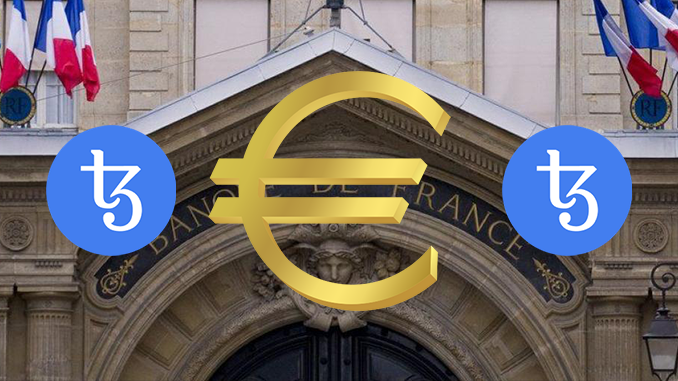
From France comes the news that the Blockchain of Tezos (XTZ) is being tried out there to test a state E-Euro. The project is implemented by a branch of the commercial bank Société Générale and the developers of Nomadic Labs.
In the euro zone, it is France that is setting the pace for the possible introduction of an E-Euro. The central bank in Paris had already published a call for tender in spring to find project partners. Two of them, Nomadic Labs and Société Générale, now want to use the Tezos block chain (XTZ) to demonstrate how an E-Euro could function as a Central Bank Digital Currency (CBDC) for inter-bank transactions. This is according to a press release from Nomadic Labs, a French-based development office focused on Tezos.
Blockchain from Tezos as an ideal solution for E-Euro?
According to Nomadic Labs, Société Générale, through its start-up branch Forge, selected the Tezos Blockchain for testing for several reasons. Tezos’ own block chain scored points with the Proof-of-Stake protocol and a simple programming language for Smart Contracts. However, the French project has nothing to do with the crypto currency XTZ. It is all about the Tezos block chain as the technological basis for a CBDC. Interesting in this context: According to Tezos a comparable concept is also being tested in the Ukraine.
In France, various other commercial banks and development agencies have been designated by the central bank to test an e-euro. Whether the approach of Nomadic Labs and Société Générale will ultimately be successful is therefore open to question. For one thing is surprising: In other countries such as Sweden, for example, they are also well advanced in terms of a CBDC, but usually rely on a centralized network to test a state-supported digital currency. The block chain of Tezos, on the other hand, is public and decentralized, and intervention by a higher authority such as the central bank is in principle ruled out.
Conclusion: The E-Euro only a matter of time?
From the ranks of the European Central Bank (ECB), there is a growing number of voices urging that the idea of an E-Euro become reality. With its national initiative, France is positioning itself as the country that could take the lead in feasibility studies. But anyone who knows the skepticism of some central bankers also knows that if the E-Euro comes, it will not do without a central office. But in countries such as the Ukraine, where confidence in the national currency has been shaken, decentralized approaches could prevail. Tezos can certainly look forward to being classified as stable, secure and flexible enough through smart contracts to be mentioned repeatedly in the discussion about CBDCs.
Best place to buy Bitcoin and Tezos:

Leave a Reply